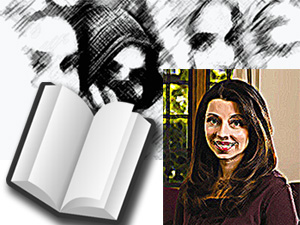Page 1 Page 2

“How can you condemn the book if you’ve never read it,” she said.
A good point…
“I’ve read parts of it…I’ve read excerpts,” I said, feeling the weakness of my own argument. I looked around the café and wished for the umpteenth time we had chosen a more original spot. As my coffee cooled, the sweetness made me cringe. In my teens I had attempted to read the entire book but could not get past the third chapter. I found the writing dense, almost psychedelic. I knew what the controversial parts were about. I had seen them referenced in newspapers and magazines. Yet, I still maintained my resentment of the author. After all this time, I still did not have the words to adequately explain my betrayal. I resolved to read the book again.
I was sixteen when I first visited Karachi. It was a densely-packed ghetto filled with traffic and noise, chaos and graffiti, especially the roads that were as crooked as a piece of cracked glass. Still, the population barreled onwards, in cars, taxis, rickshaws and scooters. Entire families rode on top of a single motorcycle, zipping in and out of traffic. A blanket of dust, pollution and smog coated the city, but the natives were as oblivious to it as fish are to water. Pakistan was a mountain; no, a heap; or better yet, a pile of dung, and at the very top of it were the elite.
I was too young to notice them. To me the elite were like ghosts whose existence I had not yet learned to recognize. The fact that my relatives belonged to the professional class blinded me to what existed beyond their plane. They were doctors and engineers and lawyers. They had cars and often drivers. They had help to clean their houses and wash their dishes and watch their children. When I visited Karachi, I bought tailor-made clothes, went to the beauty parlor, and attended wedding banquets at fancy American hotels like the Holiday Inn. I began to think we were the elite. That was how naïve I was. I realized now that we only worked for the elite in hospitals, companies and governments that were run by the upper class.
Religion was everywhere. It was so pervasive than no one noticed it any more than the air that they breathed. It made our community slightly Victorian in flavor, as we worried about missing prayers and fasting in Ramadan. Nobody drank; nor could anyone tell you where to find a good bottle of wine. And men and women were rarely friends, often favoring arranged marriages with like-minded people from suitable families. These puritans, however, loved their saints, ardently and passionately. In a country where poverty and illiteracy were constant companions, what appeal was there in the material world? It was all about the afterlife.
In contrast, the elite were a different species altogether. Unlike the rest of the population, they had far-reaching wings, a jet-setting lifestyle. They were not shackled to the country of their birth like their brethren. Access to the rest of the world via not only travel but also Internet, satellites and elite schools, meant that the rich were neither constrained by geography nor ideology. In fact, while the rest of the country observed religion, the elite remained comfortably atheist or agnostic.
This was the community that our aforementioned author came from, with his elite schools and Oxford education. Like many rulers, he failed to see the servant class living around him: the driver, the maid, the street vendor on the corner, little worker ants whose existence was too petty to notice. Had he come from a more modest background, I might have thought he was brave, but much of what was controversial came not from courage but ignorance, for he had no idea that these ants could raise their voices in protests.
The larger population (commoners) never had much credence for literary technique. Their betrayal was that of a child that has a cherished toy snatched out of his hands, stomped on and thrown into the sewer, and they came at him with blows. I understood their outrage. I had yet to understand mine.
I read the book again, the whole thing, cover to cover. I left nothing to chance. I found the words I did not have when I was sipping coffee with a Pakistani friend one spring afternoon… my friend with the Ivy League education who thought teaching children about religion was child abuse.
In ghazals a tavern is a place where one receives spiritual enlightenment; can the same be said for a coffeehouse? Here are the pearls that came sweating out of me, like a much-needed purge.
After all these years I realized that my grievances fell in three parts. First, I sympathized with Muslims, whose most sacred figures were contorted to depict the vilest of characters. My second grievance was with the clergy for creating a PR nightmare, and making us all look like we were crazy. My third grievance was with the West, for not only defending the writer but glorifying him. It was this glorification, even knighthood, that made it seem to our community that tactlessness and insensitivity towards another culture’s values was a noble trait, especially if that culture was Islamic.
I understand as I say this that this last statement opens up more doors than it closes, but these are your issues to ponder. As for me, I have done my penance. I am no longer Atlas, with the world upon my shoulders. With a straight back, I can revisit that day where my only ambition was to catch the attention of a handsome boy. I can tell you that eventually I joined the rest of the party, chatted with my aunts and cousins, and helped served the appetizers, all while the ghazal artists lamented about the pain and bliss of love and intoxication.
Page 1 Page 2
Pages: 1 2

